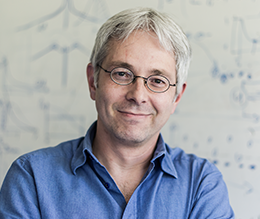Distinguished iNANO Lecture: Single-Molecule Spectroscopy of Intrinsically Disordered Proteins and Their Interaction Mechanisms
Ben Schuler, Department of Biochemistry and Department of Physics, University of Zurich, Switzerland
Info about event
Time
Location
iNANO AUD (1593-012), Gustav Wieds Vej 14, 8000 Aarhus C

Dr. Ben Schuler, Professor of Molecular Biophysics
Department of Biochemistry and Department of Physics
University of Zurich, Switzerland
Single-Molecule Spectroscopy of Intrinsically Disordered Proteins and Their Interaction Mechanisms
The functions of proteins have traditionally been linked to their well-defined three-dimensional, folded structures. It is becoming increasingly clear, however, that many proteins perform essential functions without being folded. Single-molecule spectroscopy provides new opportunities for investigating the structure and dynamics of such unfolded or ‘intrinsically disordered’ proteins (IDPs). The combination of single-molecule Förster resonance energy transfer (FRET) with nanosecond correlation spectroscopy, microfluidic mixing, and other advanced methods can be used to probe intra- and intermolecular distance distributions, reconfiguration dynamics, and interactions on a wide range of timescales, and even in heterogeneous environments, including live cells.
I will illustrate the use of single-molecule FRET in combination with other biophysical methods in the context of an unexpected interaction mechanism that we recently discovered: The two intrinsically disordered human proteins histone H1 and its nuclear chaperone prothymosin α associate in a one-to-one complex with picomolar affinity, but they fully retain their structural disorder, long-range flexibility, and highly dynamic character. Based on the close integration of single-molecule experiments, NMR, and molecular simulations, we obtained a detailed picture of this complex that can be explained by the large opposite net charge of the two proteins without requiring defined binding sites or interactions between specific individual residues. This type of interaction has interesting ramifications for kinetic mechanisms of binding and cellular regulation.
Host: Associate professor Victoria Birkedal, iNANO & Dept. of Chemistry, Aarhus University
Coffee, tea, and buns will be served from 10 am in front of the auditorium.
